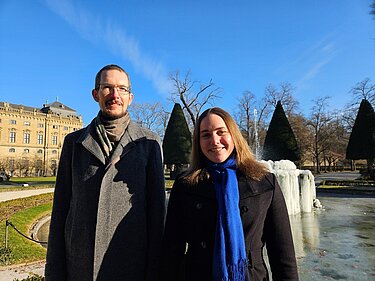PAK-Projekt „Mönchtum und lokale Selbstorganisierung: Monastische Briefe, horizontale Bindungskräfte und städtische Gesellschaft in der Spätantike“

Projektleiter: Prof. Dr. Jan R. Stenger
Wissenschaftliche Mitarbeiterin: Dr. Sandra Erker
Seit dem 1. Januar 2024 wird am Lehrstuhl für Klassische Philologie I das von der DFG geförderte Forschungsprojekt „Mönchtum und lokale Selbstorganisierung: Monastische Briefe, horizontale Bindungskräfte und städtische Gesellschaft in der Spätantike“ durchgeführt. Es untersucht die Rolle und Wirkungsweise monastischer Briefliteratur in der Entstehung und Praxis lokaler Selbstorganisierung im Osten des spätantiken Römischen Reiches (5. und 6. Jahrhundert n. Chr.). Dafür konzentriert es sich auf die in großer Zahl erhaltenen Briefe des Isidor von Pelusion und der Mönche Barsanuphios und Johannes von Gaza.
Projektleiter Jan Stenger befasst sich mit den Briefen, mit denen die beiden Mönche Barsanuphios und Johannes sich sowohl an Mitbrüder als auch an die lokale Laienbevölkerung von Gaza wandten. Hier soll untersucht werden, auf welche Weise die schriftliche Kommunikation der Mönche dazu beitrug, Fragen und Probleme des lokalen Zusammenlebens zu lösen und dadurch Bindungen in der lokalen Gruppe zu stärken. Die Fallstudie zum Briefcorpus des Isidor von Pelusion wird von Dr. Sandra Erker bearbeitet. Im Zentrum dieses Vorhabens stehen die Kommunikationsstrategien der monastischen Briefe und ihre Bedeutung für die Organisierung des gemeinschaftlichen Lebens im lokalen Kontext der ägyptischen Stadt Pelusion.
Die vergleichende Untersuchung der Corpora des Isidor und des Barsanuphios und Johannes wird beleuchten, dass die monastischen Briefe vitale Funktionen für die lokale Gemeinschaftsbildung und die Lösung gesellschaftlicher Probleme erfüllten. Dadurch soll die große Bedeutung und Wirksamkeit horizontaler Bindungskräfte in den grundsätzlich vertikal strukturierten spätantiken Gesellschaften aufgezeigt werden. Gleichzeitig soll damit eine Neubewertung der gesellschaftlichen Rolle monastischer Briefliteratur erreicht werden, indem deren Beitrag zu Stabilität und Funktionieren der Gesellschaften des spätantiken Reiches aufgezeigt wird.
Das philologische Projekt ist Teil des interdisziplinären DFG-Paketvorhabens 1066 Lokalität und Gesellschaft: horizontale Bindungskräfte in der Antike und entsteht in Zusammenarbeit mit Prof. Dr. Barbara Schmitz (Altes Testament) und Prof. Dr. Rene Pfeilschifter (Alte Geschichte) sowie deren Mitarbeitern. Die beiden anderen Projekte untersuchen ebenfalls selbstregelnde Gruppen in antiken Gesellschaften zu unterschiedlichen Zeiten und in verschiedenen Regionen.
DFG Project Monasticism and Local Self-Organisation: Monastic Letters, Horizontal Binding Forces, and Urban Community in Late Antiquity
PI: Prof Jan R. Stenger
Postdoc Researcher: Dr Sandra Erker
Since 1 January 2024, the DFG-funded research project ‘Monasticism and local self-organisation: monastic letters, horizontal binding forces, and urban community in late antiquity’ is being carried out at the Chair of Classics I at the Julius-Maximilians-Universität Würzburg. It investigates the role and function of monastic epistolary writing in the emergence and practice of local self-organisation in the east of the late antique Roman Empire (5th and 6th centuries). The focus is on the massive letter collections of Isidore of Pelusium and the monks Barsanuphius and John of Gaza.
PI Jan Stenger examines the letters in which the two monks Barsanuphius and John addressed both other monastics and the local lay population of Gaza. The aim is to analyse the ways in which the monks’ written communication contributed to addressing issues and problems of communal life and thereby strengthened binding forces within the local group. The case study on the letter corpus of Isidore of Pelusium is being conducted by Dr. Sandra Erker. This project studies the communication strategies of the monastic letters and their role in the organisation of community life in the local context of the Egyptian town of Pelusium.
The comparative study of the corpora of Isidore and the Gazan monks will shed light on the vital functions that the monastic letters fulfilled for local community building and for addressing issues arising from the local context. This will demonstrate the great importance and working of horizontal binding forces in the fundamentally vertically structured societies of late antiquity. At the same time, we will achieve a reassessment of the role of monastic epistolary literature in society by demonstrating its contribution to the stability and functioning of the societies of the late antique empire.
The philological project is part of the interdisciplinary DFG project 1066 Locality and Society: Horizontal Binding Forces in Antiquity and is being conducted in collaboration with Prof. Dr. Barbara Schmitz (Old Testament) and Prof. Dr. Rene Pfeilschifter (Ancient History). The two other projects also investigate self-organising groups in ancient societies in different time periods and regions.






